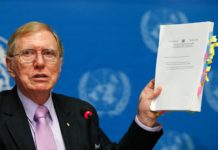In March, the UK Home Office issued two documents, Country Information and Guidance Eritrea: National (incl. Military) Service and Country Information and Guidance Eritrea: Illegal Exit, which in a combined 64 pages have hardened the asylum rules by which thousands of Eritreans will be judged. These updated pieces of guidance now represent the most up-to-date element of the UK’s official opinion on asylum applications from Eritreans and follow a joint delegation from the Foreign and Commonwealth Office (FCO) and Home Office to Asmara over three days in December 2014. Despite referencing critical reports from Amnesty International, Human Rights Watch and ample media coverage of the persecution Eritreans are subjected to, the report rests its conclusions on the highly discredited Danish Immigration Service’s report from late 2014. This report has now been sidelined by the Danish Government after criticism from the report’s sources, authors and from across the spectrum of human rights and asylum organisations.
The Home Office’s new view
The Home Office’s main divergence from its previous opinion, and the opinion of many human rights organisations, is on the issue of National Service. Under this new guidance National Service in Eritrea no longer constitutes persecution, degrading or inhumane treatment; it does not equate to forced labour; it is not indefinite; and, therefore, it does not form the basis of a legitimate asylum claim. Furthermore, the Home Office now views desertion from the military and illegal exit from the country as not giving rise to well-founded fear of persecution or serious harm. The requirement that, in order to gain a passport or travel document, Eritreans who had left the country would pay a “reasonable request to pay Disapora tax” (set at 2 per cent) and sign a ‘letter of apology’ at an Eritrean embassy was not viewed by the Home Office as placing those concerned at risk. As the guidance on illegal exit summarises “previous country guidance indicated that those who had left illegally were at risk on return to Eritrea. However, up-to-date information from inside Eritrea suggests this is no longer the case.” This jars with the information gathered by nearly every other organisation. In fact, cases of punishment for those who evade military service and return to Eritrea abound – but they are no longer viewed as reliable by the Home Office. Instead, it reckons on those refusing National Service merely being required to return to their service, service which is often indefinite but now not viewed as inhumane. Putting aside the inaccuracies in the Home Office’s judgement of National Service as not inhumane, it is big leap of faith to say that returning Eritreans will not be punished – a leap of faith which unfortunate returnees will be forced to take.
The Home Office does reserve, in its guidance on National Service, some protection for “those who have been involved in high-profile opposition to the Government.” The high bar of opposition now being asked of asylum seekers is not further defined.
With the impact of this new guidance set to be felt by thousands of Eritrean asylum seekers in the UK over the coming years, it is a sad reversal for a country which had previously taken a more enlightened stance. The UK had previously agreed with the UN High Commissioner for Refugees (UNHCR) which, in relation to national service, advises that ‘in practice, the punishment for desertion or evasion is so severe and disproportionate such as to amount to persecution.’
Danish Report Rubbished
The Danish Immigration Service report, the basis for many of the Home Office’s conclusions, had been widely criticised and dismissed as not reflective of the reality faced inside and outside Eritrea. Human Rights Watch’s deputy Africa director, Leslie Lefkow, responded to it saying that “the Danish report seems more like a political effort to stem migration than an honest assessment of Eritrea’s human rights situation.” The final nail in its coffin was when two out of three of the reports authors distanced themselves from it and its only named source criticised the findings. As a result the Danish Government intervened to quietly overrule the reports findings merely two weeks after its release and ensured Eritreans could expect to be “granted asylum in many cases.”
The UK Home Office is under immense pressure to limit the nebulous political issue of ‘immigration’. Often included within this issue is the plight of refugees who flee violence and persecution – with Eritreans having as valid a claim as others. These political pressures can, as Human Rights Watch has warned, lead to political efforts to stem migration.

At the time the British Government was visiting Asmara, the Danish Government was sidelining the report on which the UK would base much of their new guidance. More importantly, thousands of Eritreans were making their way through Sudan, Libya and across the Mediterranean in search of a life with more freedom and less repression.
Thousands of Eritreans risk everything in Mediterranean boat smuggling
No one can have failed to see the deaths last week of migrants and asylum seekers trying to reach Europe by boat across the Mediterranean. Eritreans fleeing the brutal dictatorship are now revealed as the second largest population, behind Syrians, both in terms of asylum applications across Europe in 2014 and in people arriving via the Mediterranean so far in 2015, according to the UN Refugee Agency. Sadly, Eritreans have born the brunt of recent deaths as the tragedy of the ‘deadliest incident on record’ where 28 survivors were rescued from a boat that held 850, included 350 Eritreans.
In the days that followed several deadly incidents, the media began to look at why Eritreans were taking such big risks in such big numbers. One refugee summed up the feeling telling The Guardian ‘if I die at sea, it’s not a problem – at least I won’t be tortured.’ Business Insider writer, Armin Rosen, writing about ‘the depressing reason the Mediterranean migrant crisis won’t end any time soon,’ concluded that the crisis demonstrates “how far people are willing to go to escape oppressive governments, and push against the widely held delusion that entire populations can be conditioned to the whims and megalomania of authoritarian governments.” In Foreign Policy, Michela Wrong challenged the assumption that Eritrea’s supposed successful work on some of the Millennium Development Goals made it a good model for others, instead she described the country as ‘an elegant cage – a suffocating place to live’. The Sunday Telegraph’s Chief Foreign Correspondent Colin Freeman characterized the country, and its indefinite National Service, as a “modern-day Sparta.”
Eritrea in EU Parliament
Written Question to the European Commission on EU aid package Eritrea. Judith Sargentini MEP, a member of the Dutch Greens, is asking:
In a press release by Reuters on 24 March 2015, a reference is made to the EU aid package to Eritrea that is supposedly being prepared by the European Commission. Amongst the objectives of the aid package there would be the aim to “stem a growing exodus of Eritreans to Europe”.
- Can the European Commission confirm that they are preparing an aid package for the Eritrean government
- If so, how does the European Commission assess the current human rights situation in Eritrea as the EU’s legal provisions indentify human rights as an essential element for development cooperation?
- Can the European Commission comment on the contents of this aid package, in terms of value and objectives, specifically addressing the “hope to curb the exodus” from Eritrea through development aid?
We will keep you updated with any response we get…
Latest policy and further reading
- Oral Update by Mr. Mike Smith, Chair of the Commission of Inquiry on Human Rights in Eritrea at the 28th session of the Human Rights Council (16 March 2015)
- UK Home Office: Country Information and Guidance – Eritrea: Illegal Exit (March 2015)
- UK Home Office: Country information and guidance report – Eritrea national (including military) service (March 2015)
- Foreign and Commonwealth Office: Eritrea – Country of Concern (12 March 2015)







